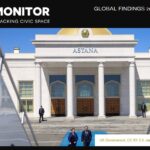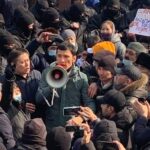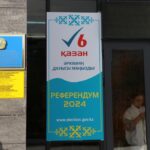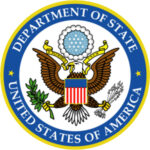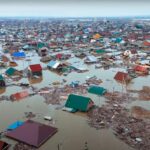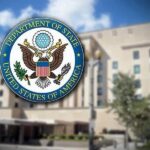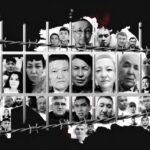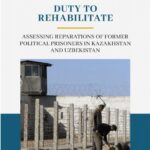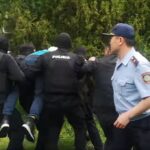Statement of preliminary and conclusions
Astana, 27 April 2015 – Following an invitation from the Ministry of Foreign Affairs of the Republic of Kazakhstan and based on the recommendation of a Needs Assessment Mission conducted from 3 to 6 March, the OSCE/ODIHR has deployed an Election Observation Mission (EOM) to observe the 26 April early presidential election. Cornelia Jonker is the Head of the OSCE/ODIHR EOM.
The election was assessed for its compliance with OSCE commitments, other international obligations and standards for democratic elections, and with national legislation. This Statement of Preliminary Findings and Conclusions is delivered prior to the completion of the election process. The final assessment of the elections will depend, in part, on the conduct of the remaining stages of the election process, including the tabulation and announcement of results, and the handling of possible post-election day complaints and appeals. The OSCE/ODIHR will issue a comprehensive final report, including recommendations for potential improvements, some eight weeks after the completion of the election process.
Preliminary conclusions
Preparations for the 26 April election were efficiently administered, however, necessary reforms for holding genuine democratic elections still have to materialize. The predominant position of the incumbent and the lack of genuine opposition limited voter choice. A restricted media environment stifled public debate and freedom of expression. Election day generally proceeded in an orderly manner, but serious procedural deficiencies and irregularities were noted throughout the voting, counting and tabulation processes. ODIHR stands ready to assist Kazakhstan to remedy identified deficiencies.
The incumbent and his political party dominate politics and there is lack of credible opposition in the country, with several prominent critics of the government either imprisoned or living in exile. The current consolidation of political power challenges the development of political pluralism, as committed to in the 1990 OSCE Copenhagen Document.
Voters were not offered a genuine choice between political alternatives. The two opponents to the incumbent openly praised the President’s achievements. During the campaign period, the incumbent actively toured the country in his official capacity. The involvement of government officials in the campaign and the location of Nur Otan offices in government buildings blurred the line between State and party. Credible reports of pressure being put on voters to attend rallies and vote in high numbers for the incumbent, raised concerns about voters’ ability to cast their vote “free of fear of retribution,” as required by the 1990 OSCE Copenhagen Document.
The legal framework provides a technical basis for the conduct of elections, but undue restrictions on suffrage rights, as well as on fundamental freedoms of assembly and expression, contradict key OSCE commitments for democratic elections. Despite recent amendments, previous OSCE/ODIHR recommendations remain unaddressed in the Election Law, including key provisions related to the composition of election commissions, candidate registration and the complaints and appeals process. This underscores the need for further legal reform.
Overall, the election was efficiently administered; all electoral deadlines were met and commissions at all levels were open to observers and the media. The Election Law does not provide a mechanism for ensuring equitable political party representation in election commissions. In many mid- and lower-level commissions visited by the OSCE/ODIHR EOM, members and almost all chairpersons were affiliated with Nur Otan, raising questions about their impartiality. The Central Election Commission (CEC) did not issue detailed regulations or guidelines for the verification of candidate support signatures and the tabulation process; this affected the consistent application of the law.
Over 9.5 million voters were registered for this election. Most OSCE/ODIHR EOM interlocutors did not express concerns about the accuracy of voter lists. However, there are no uniform means for compiling voter lists and procedures for cross-checking lists do not sufficiently guard against multiple entries. A blanket denial of voting rights of those serving prison sentences lacks proportionality, at odds with OSCE commitments.
The limit of two consecutive terms that can be served by any one individual does not apply to the incumbent, as the First President. Restrictions to the right to be elected, including the residency requirement and the exclusion of all persons with a criminal record irrespective of the gravity of the crime, are contrary to international standards for democratic elections.
Candidacy requirements together with the application of a language test for candidates had a negative impact upon the inclusiveness of the candidate registration process. There were no clear criteria for evaluating the language test, leaving assessments to the discretion of the CEC appointed Linguistic Commission. Out of 27 nominees, 3 candidates were registered.
There were no women candidates for president, although there were two women nominees. Women represented more than half of the members and chaired more than a third of the commissions visited by the OSCE/ODIHR EOM.
Campaign finance transparency is limited by a lack of requirements for public disclosure and preelection reporting. Self-nominated candidates have access to and can therefore spend less money than candidates nominated by political parties or other public associations.
A restrictive legal framework for media and recent sanctions, including closure and blocking of websites, decreased the diversity of viewpoints and stifled public debate. Despite prior OSCE/ODIHR recommendations, defamation remains a criminal offence. The lack of campaign coverage in the media considerably limited the opportunity for voters to make a well-informed choice. In media monitored by the OSCE/ODIHR EOM, candidates were given even coverage but the incumbent was also extensively covered in his official capacity, thus contributing to an uneven playing field.
The legal framework provides for the right of redress and judicial review to all election participants, but limits the right to appeal final election results. The legislation insufficiently elaborates complaint procedures and allows for overlapping jurisdictions. In the pre-election period, five complaints were filed with the courts, all of which were dismissed as ungrounded, and none to the CEC.
Election day generally proceeded in an orderly manner, but serious procedural deficiencies and irregularities were observed throughout the voting, counting and tabulation processes, including indications of ballot box stuffing. Transparency of the process was limited, with numerous PECs and DECs not providing the OSCE/ODIHR EOM observers the possibility of meaningful observation, or obliging them to remain in designated areas. The preliminary turnout announced by the CEC was 95.22 per cent.
Preliminary findings
Background
On 25 February, President Nursultan Nazarbayev, the country’s president since 1991, set the date for the early presidential election to take place on 26 April. This was the second consecutive presidential election to be held early. The authorities expressed their commitment to conduct elections in line with national legislation and international standards.
President Nazarbayev’s Nur Otan party holds 83 out of the 98 directly-elected seats in the Majilis (lower chamber of the parliament), while Ak Zhol and the Communist People’s Party of Kazakhstan (CPPK) hold eight and seven seats respectively. Despite having three parties in the parliament and six other registered political parties, the President and Nur Otan dominate national politics. Six parties, including all parliamentary parties, endorsed the incumbent’s candidature for this election. 2 On 25 December 2014, the Almaty Economic Court ordered the suspension of the Communist Party of Kazakhstan’s (CPK) activities. Azat and the National Social Democratic Party (NSDP) decided not to field a candidate for this election. There is a lack of genuine opposition in the country, with several prominent critics of the government either imprisoned or living in exile.
At the end of 2014, the President introduced an economic stimulus programme called Nurly Zhol (Bright Path). It builds on the “Kazakhstan-2050” strategy that aims to create conditions for Kazakhstan to join the 30 most developed countries in the world by 2050. On 11 February, the President declared that the country faces economic difficulties and requires significant reform. Several OSCE/ODIHR EOM interlocutors stated that Kazakhstan’s policy of ensuring stability and economic prosperity prevails over the protection of fundamental freedoms. The current consolidation of political power challenges the development of genuine political pluralism, as committed to in the 1990 OSCE Copenhagen Document.
Electoral System and Legal Framework
Kazakhstan is a presidential republic. The president has the authority to appoint and dismiss the prime minister, the prosecutor general, judges at all levels and all heads of local executive authorities. The president has the right to dissolve the parliament, and veto legislation passed by parliament and decisions of the Constitutional Council.
The president is directly elected for a five year term by an absolute majority. If no candidate receives above 50 per cent of the votes cast, a second round between the two candidates with the highest number of votes is held within two months. There is a constitutional limit of two consecutive terms that can be served by any one individual. This restriction does not apply to the incumbent, as the First President.
The presidential election is governed by the Constitution, the Constitutional Law on Elections (Election Law) and Central Election Commission (CEC) regulations. In 2014, the Election Law and other laws regulating aspects of the electoral process were subject to change. Amendments to the Administrative Offences Code provided more detailed definitions of electoral offences. Also, in a positive step, the CEC issued regulations on procedures for sealing ballots boxes and the verification of candidate support signatures, although the latter would benefit from further elaboration. Amendments to the Election Law, however, did not address previous OSCE/ODIHR recommendations, including on the formation of election commissions, removal of restrictive candidate registration requirements, and clarification of complaints and appeals processes.
The legal framework gives a technical basis for the conduct of elections, overall. However, the shortcomings identified in this Statement underscore the need for further legal reform to provide necessary conditions for the conduct of democratic elections in line with OSCE commitments and other international obligations and standards. Further, the special legal status and protection enjoyed by the President limits the possibility of a level playing field, as required by OSCE commitments.
Election Administration
The election is administered by a four-tiered system comprised of the CEC, 16 Territorial Election Commissions (TECs), 208 District Election Commissions (DECs), and 9,741 Precinct Election Commissions (PECs), including 65 PECs in diplomatic missions in 51 countries.
By law, all commissions have seven members appointed for a five-year term. The CEC chairperson and two members are appointed by the president, with the Senate and Majilis each appointing two members. The current CEC has six members, two of which are women. All were re-appointed in February-March 2015 and one position is vacant. TEC, DEC and PEC members were appointed by the corresponding Maslikhats (local councils) in March 2014, based on nominations from political parties and, in case of insufficient proposals, from public associations, and then from superior election commissions. Women represented more than half of the members and chaired more than a third of the commissions visited by the OSCE/ODIHR EOM.
The Election Law does not effectively provide for balanced political party representation in the mid- and lower-level commissions. Although each party or public association can nominate one member per commission, Maslikhats are not bound by these nominations. Moreover, the Election Law allows a member of one organization to be nominated by another organization. In practice, many commission members visited by the OSCE/ODIHR EOM were de facto affiliated with Nur Otan, which also held almost all chairperson positions. This raises concern about the impartiality of the lower levels of election administration, challenging international standards.
In commissions visited by the OSCE/ODIHR EOM, more than a fifth of the members appointed in 2014 were replaced this year. A superior election commission can appoint a temporary replacement until a new commissioner is appointed. The Election Law does not specify the criteria for such replacements, nor requires that a replacement comes from the same organization. A number of the commissioners met with by the EOM were not aware of which organization nominated them, of their listed party affiliation, or how the appointment process was conducted.
More than half of the election commissions visited by the OSCE/ODIHR EOM were located in local government buildings and the leadership of more than a third of the commissions visited were also supervisors of commission members in their regular jobs. This could affect the independence of election commissions’ activities, as commissioners could face potential conflict of interests.
Preparations for the election were efficiently administered; all electoral deadlines were respected and election commissions, including the CEC, were generally transparent in their work. CEC sessions were open to observers, proxies and the media. The CEC did not publish agendas prior to sessions; however, this is not required by the law. All CEC decisions were posted online, albeit a few with delay.
The CEC produced manuals and videos for training election commissions.More than half of the members of election commissions visited by the OSCE/ODIHR EOM were trained. However, election commissions had varied interpretations of the law due to a lack of practical training programmes, detailed instructions and procedural clarifications, particularly on counting and DEC tabulation of results.
The CEC also developed an extensive voter education programme, with television spots, billboards, and posters. In an inclusive manner, voters could check their registration details and the location of their polling stations on the internet or by calling special hotlines.
Voter Registration
All citizens over 18 years of age have the right to vote, except those declared incompetent by a court or those serving prison sentences, irrespective of the gravity of the crime. This blanket provision poses an unreasonable restriction that is at odds with international obligations and OSCE commitments.
Voter registration is passive, according to voters’ place of residence. There are no uniform means of collecting data for the voter lists. Each Akimat (local administration) compiled lists based on data provided by any institution dealing with the population register and from information collected through door-to-door visits. The CEC is responsible for checking the data for possible multiple registrations against a national electronic register.
Voters could also apply to be included in a voter list according to their temporary residence (up to 30 days before election day), or request to vote at any polling station outside the city, town or village where they are registered, by Absentee Voting Certificate (AVC). Voter lists for 571 special polling stations were compiled, including at medical centres, detention centres, remote locations and out-of-country polling stations. PECs are instructed to remove voters on special voter lists from their regular voter lists. PECs could also register voters on election day if they were not on the voter list but were able to prove residence in the respective precinct. Voter registration on election day is not in line with good practice and it could result in multiple voter registrations.
The number of registered voters was 9,514,988 as of 5 April. Voters could verify and request changes of their data or inclusion in the voter lists at PECs starting on 11 April. According to the CEC, changes in the voter list during the familiarization period and on election day will be reflected in the permanent voter lists maintained by the Akimats.
The voter registration process provides for the participation of eligible voters in the electoral process. Most OSCE/ODIHR EOM interlocutors did not express concerns about the inclusiveness and accuracy of the voter lists. However, after the CEC verification against possible multiple registrations, there is no centralized cross-checking mechanism to ensure that a voter is only on one voter list as required by law. In addition, there is no post-election audit of the voter lists to identify incidents of multiple voting, particularly from special polling stations.
Candidate Registration
A candidate must be a citizen of Kazakhstan by birth, at least 40 years old, fluent in the Kazakh language, and officially resident in the country for the last 15 years. Persons serving criminal sentences, with a criminal record that has not been expunged, or a conviction for a crime or administrative offence involving corruption cannot run for office. Limitations based on the length of residency as well as the blanket restriction of those convicted of a crime are contrary to OSCE commitments and other international obligations and standards.
A candidate may be self-nominated or nominated by a public association, including a political party. To be registered, nominees must have their eligibility verified by the CEC, pass a language test, collect supporting signatures, submit tax declarations, and pay a deposit of 1.07 million Kazakhstan Tenge (KZT).21 Candidate nomination was from 26 February to 15 March. There were 25 self-nominated candidates and 2 nominated by political parties. Two nominees were women, and one was ethnic Uzbek. The CEC had up to five days to verify nominees’ eligibility. Two were rejected for being below the minimum age; three withdrew; four did not appear for the mandatory Kazakh language test organized by a Linguistic Commission; eight failed this test; three presented themselves in front of the Linguistic Commission but refused to take the test on the grounds of not agreeing with the Commission’s composition or the testing procedure; and seven passed the test.
The Rules of Procedures of the Linguistic Commission do not indicate how many mistakes are allowed, or what precisely constitutes a mistake. Several nominees informed the OSCE/ODIHR EOM that the assessment criteria were discretionary and that the Commission went beyond legal requirements in evaluating the nominees’ style and knowledge of different subjects. It is also not clear what accommodation would be made for persons with physical or sensory disabilities.
Following eligibility verification, the seven remaining nominees were to be issued sheets for the collection of candidate support signatures. Commendably, the CEC reduced the periods of issuing sheets from five to two days and for TEC verification of signatures from ten to five days. However, the timeline for candidate registration gives late nominees fewer days to collect signatures. Each nominee had to collect signatures from at least one per cent of the total number of registered voters (93,012), equally representing at least two thirds of the regions. To verify signatures, TECs check every entry against population databases in co-operation with local institutions. A CEC decision from 9 March on signature verification provided limited guidance for the TECs and no clarification on what constitutes a duplicate signature.
Three candidates were registered for the election: President Nazarbayev, nominated by Nur Otan, with 560,523 signatures submitted and verified within three days; Turgun Syzdykov, nominated by CPPK, with 98,384 signatures submitted and verified within six days; and Abelgazi Kusainov, Chairperson of the Federation of Trade Unions and member of Nur Otan, with 132,152 signatures submitted and verified within three days. One self-nominee collected about 40,000 within 8 days. The other nominees chose not to collect their signature sheets. Signature sheets were destroyed ten days after the registration of a candidate, in accordance with CEC procedures.
Election Campaign
The official campaign started on 26 March, the day after the close of candidate registration, and ended at midnight on 24 April. Despite the stated importance of the early election, the campaign lacked vibrancy. The OSCE/ODIHR EOM observed 18 rallies: 10 organized on behalf of the incumbent, 6 for Mr. Kusainov and 3 for Mr. Syzdykov.
While the existence of three candidates constituted an appearance of political variety, it did not provide voters with a genuine choice between political alternatives. Several OSCE/ODIHR EOM interlocutors stated that they were not familiar with the names or platforms of candidates other than the incumbent’s. Both Mr. Syzdykov and Mr. Kusainov openly lauded the President for the country’s achievements.
The President announced his decision not to campaign personally but, at the same time, he actively toured the country in his official capacity. Posters and billboards of the President, both in his capacity as a candidate and as head of state promoting the “Kazakhstan-2050” and Nurly Zhol programmes, were visible throughout the country. The incumbent’s campaign materials bore a striking resemblance with the promotion materials of these state-funded programmes. Other than official CEC posters, almost no campaign materials were observed for the other two candidates.
Many Nur Otan regional offices are located in state institution buildings. Government officials, including university rectors appointed by the President, took an active role in the incumbent’s campaign meetings. This, together with the incumbent’s institutional advantage and the fact that he drew on a broad network of public sector employees, blurred the line between State and party, which is at odds with the 1990 OSCE Copenhagen Document.
The OSCE/ODIHR EOM received information from students and company employees of being instructed by supervisors to volunteer for the incumbent’s campaign, attend campaign events, and vote for the incumbent. This raises concerns about voters’ ability to cast their vote “free of fear of retribution” as required by the 1990 OSCE Copenhagen Document.
A number of initiatives were launched to encourage voter participation, underlying the importance of a high turnout to ensure a strong mandate for the president. A number of interlocutors informed the OSCE/ODIHR EOM of credible instances of administrative resources being used by local authorities and university administration to pressure electorate to turn out in high numbers.
While freedom of assembly is guaranteed in the Constitution, the Law on the Procedure for Organizing and Conducting Peaceful Assemblies, Meetings, Marches, Pickets and Rallies contains a number of limitations on holding outdoor public assemblies. A request to hold a public event, including information about the nature and organizers of the event, has to be submitted to the relevant local executive body ten days in advance. The obligation to ask for permission is not in line with international standards and good practice. Almost no requests were made to conduct open-air events in 2015. Restrictions on the freedom of assembly effectively led to a cessation of political expression through peaceful gatherings.
From 7 April onwards, a group of citizens, led by an unsuccessful presidential nominee, gathered in front of the presidential administration to request a meeting with the President in his capacity as a candidate. A number of people, including the nominee and one journalist, were detained in connection with the gathering, further questioning the respect of freedom of assembly.
Campaign Finance
The Election Law guarantees equal public campaign funds for each candidate. Private financing is also permitted including the candidate’s own funds, donations made by citizens and legal entities, and funds allocated by the candidate’s nominating body. As self-nominated candidates are not entitled to the latter source of funding, the maximum amount of financing a candidate can receive, and subsequently spend, differs for party and self-nominated candidates. This challenges paragraph 7.5 of 1990 OSCE Copenhagen Document, which provides equal rights for independent and party candidates. Other sources, anonymous and foreign donations are prohibited.
The CEC is responsible for overseeing campaign finance, on the basis of weekly reports from banks and one report from each candidate on campaign expenditures due five days after the election. There are no requirements for the candidate to report or the CEC to publish any campaign finance information prior to election day. This limits transparency of candidate finances and the voters’ ability to make an informed choice.
The law bans charitable actions by candidates once elections are announced. On 17 March, President Nazarbayev donated KZT 111,576,000 (EUR 557,880) from the “Silk Road Peace Prize” he received to the Public Association Miloserdie and the Foundation for the Development of the State Language. The CEC informed the OSCE/ODIHR EOM that it considered the President to have been acting in his official capacity. This action blurred the line between State and candidate.
Media
While there are many media outlets, there is a general lack of independent media outlets offering diverse viewpoints. Numerous sanctions, including closures of media and the blocking of websites, contribute to a stifled political discourse. Although the Constitution guarantees freedom of expression and prohibits censorship, the Criminal Code retains defamation and insult as well as special protection of the president and public officials, which is contrary to previous OSCE/ODIHR and OSCE Representative on Freedom of the Media (RFoM) recommendations. The Code also contains a provision on spreading false information, with a penalty of up to ten years of imprisonment. In combination with frequently used defamation provisions in the Civil Code that can carry substantial fines, the legal framework induces self-censorship and limits the freedom of speech.
The Election Law requires media to present objective coverage of the campaign and guarantees candidates equal access to the media. Each candidate was granted, and made use of, funds for 15 minutes of airtime on television and 10 minutes on radio, as well as the publication of two articles in the press. The law does not provide for a limit on paid advertising.
According to the OSCE/ODIHR EOM media monitoring results, the broadcast media’s coverage of the campaign was visible but imbalanced. Candidates were given nominally equal coverage, but the President was also extensively covered in his official capacity, thus contributing to an uneven playing field. Altogether, the coverage of the incumbent was approximately twice as much as that of other candidates. The state-funded Kazakhstan TV and Khabar TV dedicated a comparable portion of political prime time news coverage to all three candidates, with 20 and 18 per cent to Mr. Syzdykov, 19 and 18 per cent to Mr. Kusainov and 15 and 14 per cent to Mr. Nazarbaev. This coverage was positive and neutral in tone. However, at the same time, both channels usually started their prime time news programmes with reports about the President in his official capacity, devoting to him an additional 26 and 31 per cent of political news coverage. This was positive and neutral in its tone.
Most monitored TV channels, as well as two official state-funded newspapers, had a similar pattern in their election coverage with information on the incumbent’s official activities visibly prevailing (most notably on First Eurasian Channel with 37 per cent). A number of monitored media dedicated their attention almost exclusively to official information on the work of the authorities (president, government, local governments, and the CEC). In particular, such approach was observed in all monitored online media, with the President covered extensively (most notably on www.nur.kz with 61 per cent), while information on other candidates was largely absent.
Although the campaign was visible in nationwide and local media, there were no debates or interviews and virtually no in-depth analysis. In addition, the CEC interpreted the Election Law in a manner that any airtime given to a candidate outside the news is considered campaigning and should be paid for by the candidates. This, in combination with the media’s perception of their role to strictly comply with the principle of equal opportunity, restricted editorial freedom and did not encourage analytical coverage or critical public debate. The lack of comprehensive campaign information considerably limited the opportunity for voters to make a well-informed choice.
The CEC was responsible for overseeing media compliance with the law, in co-operation with the Committee on Communication, Informatization, and Information (Media Committee). The quantitative coverage of candidates was analysed across traditional media outlets as well as numerous online sources. While the tone of the coverage was not analysed, focus was given to identifying possible defamatory statements. Several OSCE/ODIHR EOM interlocutors stated that this may further stifle public debate (see Complaints and Appeals).
Complaints and Appeal
The legal framework provides for the right to redress and judicial review to all election participants, but limits the right to appeal final election results to the president, one fifth of the members of parliament, the speakers of both houses and the prime minister.
Election-related complaints and appeals may be filed with both election commissions and courts. All complaints must be considered within five days or immediately if submitted less than five days before the election. While the law is clear that courts have precedence over election commissions, district courts and election commissions at all levels have the authority to consider claims, making it possible to bring the same complaint before several fora. The Election Law, the Civil Procedures Code, and the Criminal Code each regulate different aspects of the electoral dispute process. Overlapping jurisdictions open up the possibility for conflicting decisions on election complaints, and makes the process unclear.
In the pre-election period five complaints were filed with the courts; three pertained to candidate registration, one challenged the president’s decree calling for an early election, and one theformation of election commissions. All cases were dismissed as ungrounded. The CEC has not received any complaints to date.
Allegations of election offenses can also be filed with public prosecutors, who are proactively monitoring media, the internet and social media networks to ensure compliance with the law. Sanctions for breaches of electoral rules include fines, correctional labour, and up to seven years imprisonment. The General Prosecutor’s Office issued warnings to two individuals for comments on Facebook that were interpreted as attempts to disgrace the honour and dignity of two of the candidates, President Nazarbayev and Mr. Syzdykov. Such warnings represent a challenge to freedom of expression.
Citizen and International Observers
The Election Law provides for observation by citizen and international observers, as well as proxies of registered candidates. The ‘Republican Public Commission for the Control of Elections’ announced deployment of some 9,500 observers. Several OSCE/ODIHR EOM interlocutors questioned the independence of this observer group, citing lack of transparency in its funding. No other citizen observer group observed the election, stating there is a lack of purpose to observe an election without genuine competition as well as a lack of funding opportunities due to the short timeframe as a result of the election being called early.
Election Day
Election day generally proceeded in an orderly manner, but serious procedural errors and irregularities were noted throughout the voting, counting and tabulation processes. Numerous indications of ballot box stuffing were noted throughout the day.
Transparency of the process was limited, with PECs and DECs not providing OSCE/ODIHR EOM observers the possibility for meaningful observation, obliging them to be seated or remain in designated areas (in 7 per cent of polling stations observed for voting; in 21 cases during counting; and 21 DECs during tabulation). PEC results protocols were not posted for public scrutiny in more than a quarter of the cases observed, as required by law.
Most polling stations opened on time, and the process was assessed as good or very good in all but three observations. While the greater part of opening procedures were followed, some procedural errors were noted: the ballot box seal numbers were not recorded in the PEC opening protocol in 9 cases observed, and the number of received ballots was not announced to observers in 22 cases. Unauthorized persons were present in 12 cases; in two of which, they were interfering with or directing the work of PECs.
The process, however, deteriorated during voting. The voting process was assessed as bad or very bad in 11 per cent of observations, which is significant. Serious irregularities were noted, including indications of ballot box stuffing in 46 cases, series of seemingly identical signatures on the voter lists (12 per cent of observations), group voting (7 per cent), proxy voting and improperly sealed ballot boxes (4 per cent each), cases of multiple voting (2 per cent), and voters being pressured who to vote (2 per cent) (including persons filming voters coming in and out of polling stations). Measures against possible multiple voting were not respected by PECs. This included not retaining the absentee voting certificates (8 per cent) or signing the voter list when issuing the ballot (3 per cent). Important procedures were not followed in 7 per cent, including not signing ballots before being issued to voters (which should make them invalid when counted – in 7 per cent), and voters voting without proper ID (4 per cent). Overcrowding was reported inside 5 per cent of polling stations observed. Unauthorized persons were present in 7 percent, but none interfered with the work of PECs. Almost half of the polling stations observed were not accessible to voters with disabilities.
The counting and tabulation processes further deteriorated. Counting was assessed as bad and very bad in more than a third of the polling stations observed; this is a substantial figure. Significant procedural problems were noted, including PECs not determining the numbers of: voters based on signatures on the voter list (43 cases), absentee voters (31), ballots (14) and signed requests for mobile voting (26). Additionally, PECs did not cancel unused ballots in 18 cases observed, did not mix the ballots from mobile and stationary ballot boxes (31 cases), did not cross-check the protocol’s control equations (35 cases), and did not correctly fill in the protocol (21 cases). PECs had difficulties filling in protocols (18 cases), and in 8 cases they pre-signed the protocol. There were indications of ballot box stuffing (18 cases), and seals of ballot boxes were not intact (3 cases). Unauthorized persons were present in 141 cases; in 4 cases they were interfering with or directing the work of PECs. Collectively, this meant that an honest count, as required by paragraph 7.4 of the 1990 OSCE Copenhagen Document, could not be guaranteed.
The tabulation process varied between districts, indicating a lack of clear guidelines and was negatively assessed in 11 DECs observed. According to observers, 7 DECs deviated from the procedures, and in 16 DECs, PEC protocols were changed without a formal decision. In most DECs, OSCE/ODIHR EOM observers were not allowed to observe the computer tabulation.
The preliminary voter turnout reported by the CEC was 95.22 per cent, varying between 97.75 in Atyrau region and 78.28 per cent in Almaty city. Preliminary results indicated that Mr. Nazarbayev won in the first round, receiving 97.7 per cent of the votes. Contrary to good practice, preliminary results by polling station were not published online, which diminished the overall transparency of the process.


